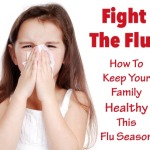Ah, springtime! That lovely, gorgeous time of year when allergy sufferers everywhere start to go into hiding and say, “Nooooo! It’s that time already? Go away, Spring!” But don’t give up just yet, allergy sufferers! You don’t have to hide from spring- #SpringItON! Here’s some helpful spring allergy tips from our good friends over at CVS MinuteClinic, just for you!
What IS an allergy?
An allergy is the body’s hypersensitivity to substances in the environment. Mold, dust, pollen, pet dander, and even some foods can cause allergic reactions.
What causes seasonal allergies?
Seasonal allergies are a reaction to small airborne substances. These allergens are small proteins that usually float around in the spring, summer and fall.
So, those springtime colds may actually be allergies?
Yes. A cold will typically clear up pretty quickly, within 7-10 days. Allergies may last weeks or even months!
Colds vs. Allergies
Did you know that 35 million Americans suffer from allergies and don’t even know it? That’s because many people confuse the symptoms of spring allergies with a common cold. Here’s what you need to know about the two:
- The main difference between a cold and allergies is that a cold is caused by a viral infection while allergy symptoms are caused by your body’s own immune system’s attempt to fight off an allergen.
- If you start sniffling and coughing at the same time each year and your symptoms come on suddenly, it may be allergies
- If you have a cough, it’s probably a cold. Most people with a cold will have a cough, but not everyone with allergies has this symptom.
- If you’re aching all over, it’s probably a cold, not allergies. Aches and pains are not symptoms of allergies.
- Itchy eyes are a common symptom of allergies but RARELY occur with the common cold!
- If you have a fever, it’s not allergies! A fever is sometimes present with a cold, but will never occur with allergies.
Treatment and Relief:
How can I protect my family and myself?
Symptoms can usually be controlled with treatment. Nasal saline, decongestants and over-the-counter or prescription antihistamines may help relieve symptoms as well.
So, how do I get allergy relief?
There are plenty of options! At CVS MinuteClinic, our nurse practitioners and physicians assistants can recommend the right over-the-counter medications and write prescriptions when medically appropriate.
If you’re diagnosed with allergies, medication may help relieve your symptoms. The best way to treat allergies is to avoid the allergen – whatever it may be.
Spring Allergy Tips
We have some daily tips to keep healthy and help prevent allergies. Don’t be caught red-eyed; arm your readers and those close to you with these tips to help prevent or reduce seasonal allergy symptoms.
- Shake it off! Before coming inside, rid your clothes of pollen with a good shake.
- Did you know hair gel could be a pollen magnet? Skip the sticky stuff during allergy season for a little extra relief.
- Avoid window fans! While convenient, they tend to bring in unwanted pollens or mold spores.
- Pull out the shades! Sunglasses protect your eyes from pollen, while keeping you looking stylish at the same time.
- Fall asleep on clean sheets. Wash your bedding every two weeks to help ease allergy symptoms.
This post was brought to you by CVS MinuteClinic.




















Leave a Reply